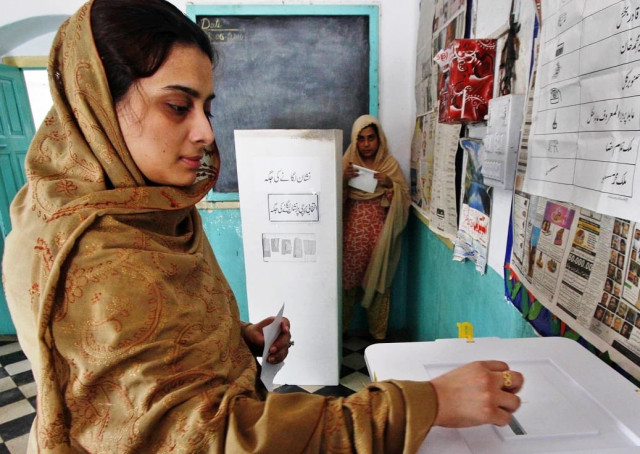Politically sidelined: Women remain excluded in first democratic transition
Lack of female polling stations, deteriorating law and order said to be the major obstacles.

Only 8 of the total 231 stations in Karak have been allocated for women. PHOTO: ONLINE
The scant number of polling stations for females and deteriorating law and order condition indicate women in Khyber-Pakhtunkhwa (K-P) and the Federally Administered Tribal Areas (Fata) will be at the receiving end regarding their participation in the upcoming polls.
“Women’s turnout is feared to be low in the upcoming elections,” said Qamar Naseem, program coordinator at Blue Veins, a non-governmental organisation working to increase women’s political participation. The reasons for this dismal situation are worsening law and order along with a lack of separate polling stations for women, he added.
Naseem questioned how dependent women would be allowed to vote in a society where men fear for their lives. He claimed the socio-cultural context was not considered when arranging polling stations in the province.
Lack of facilities
Official sources have claimed that in addition to Torghar and Kohistan districts, women in Orakzai and Bajaur have also been deprived of separate polling stations. There are no female stations in the 116 set up in South Waziristan, and none in the Frontier Regions (FR) of Kohat and Lakki Marwat either.

“The verification of polling schemes will be sent by returning officers to the Election Commission of Pakistan (ECP) for final approval,” said an official. However, no separate polling stations have been set up for women in the two FR districts and only eight of the total 231 stations in Karak have been allocated for women.
A scheme with one polling station each in Upper Dir and Chitral was suggested to returning officers. Currently, there is no arrangement for separate stations in Bajaur, Orakzai, North Waziristan, FR Peshawar, FR Lakki Marwat and FR DI Khan.
In Torghar, a total of 90 combined polling stations have been set up, while 120 have been established in Kohistan. Other areas with combined stations include Bajaur Agency with 224, Orakzai with 127, North Waziristan with 116, FR Peshawar with 23, FR Kohat with 50, and FR DI Khan with 34.
There are arrangements for only a single separate polling station each in the 288 established in Upper Dir, 258 in Chitral, and 12 in FR Bannu.
Cultural fetters
To ensure women voters participated in the polls, a mandatory 10% women voter turnout condition was suggested by the ECP for every station. However, this was unanimously rejected by political parties. “The ECP’s suggestion was a step in the right direction, but political parties’ rejection points to the fact that women are not taken seriously as agents of change,” said Naseem.
“Pakistan ratified the International Covenant on Civil and Political Rights (ICCPR) in 2010 and the Convention on the Elimination of All Forms of Discrimination against Women (CEDAW) in 1996. These legal agreements obligate the government, including the ECP, to take all measures necessary to ensure a woman’s right to vote is implemented,” said Blue Veins President Shaheen Quresh.
Despite this, however, the tribal regions remain conservative and continue to follow customs and traditions that restrict women from participating in public life, especially politics.
“Women exclude themselves from participating in politics because of the oppressive culture, which has convinced them that politics and leadership are for men. We are working to promote community-level education for women on public issues to increase their participation in the political process,” added Quresh.
Meanwhile, the security situation in the province has compelled the K-P caretaker government to set up a quick response force to guard polling stations. This could, however, be used as an excuse to keep women voters away under the garb of security concerns.
Published in The Express Tribune, May 1st, 2013.













COMMENTS
Comments are moderated and generally will be posted if they are on-topic and not abusive.
For more information, please see our Comments FAQ